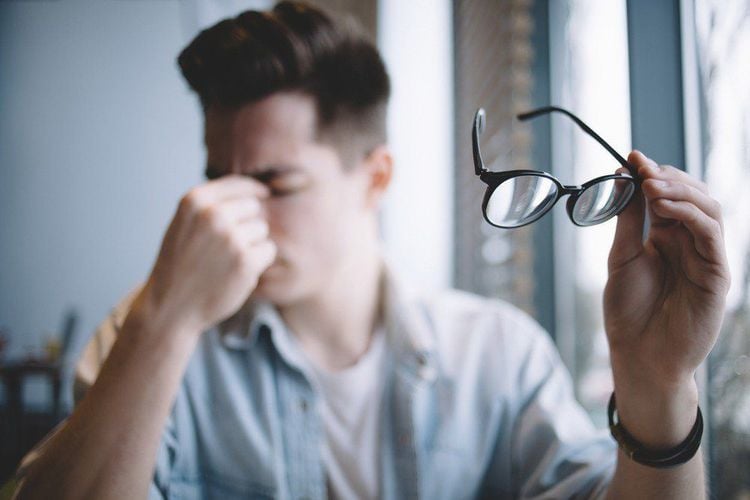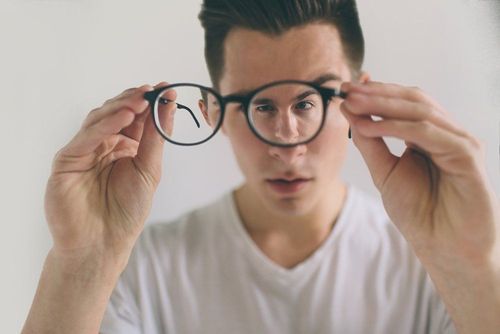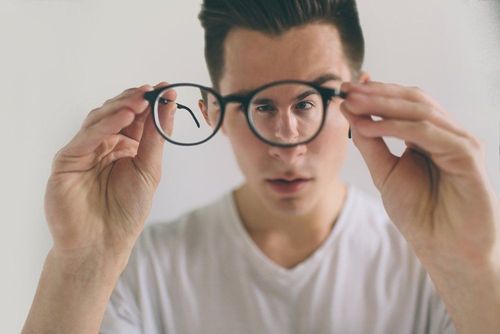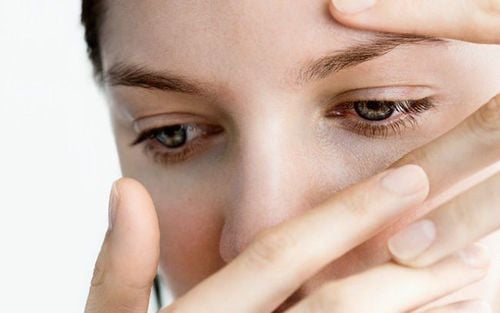This article was professionally consulted by Doctor II Nguyen Thai Hung - Department of Examination & Internal Medicine - Vinmec Da Nang International General Hospital. Doctor II Nguyen Thai Hung has 13 years of experience as an eye doctor.
Myopia is a condition in which the eyesight can only see objects close up clearly, and objects far away are blurred. Myopia glasses help adjust the image to converge properly on the retina so that people with myopia can see more clearly. But it is not necessary to wear glasses if you are nearsighted, so what degree of myopia should you wear glasses for?
1. Overview of Myopia
Myopia occurs when the eyeball is too long or the cornea is too curved. As a result, light entering the eye does not focus properly, causing distant objects to appear blurry. People with myopia have difficulty seeing a movie screen or TV, a whiteboard at school, or the road while driving.
This is a very common refractive error, affecting nearly 30% of the US population. Although the exact cause is unknown, there is evidence that many people with myopia are genetically predisposed to it. If your father and/or mother are nearsighted, you are more likely to develop this refractive error.
In addition, how you use your eyes also affects your risk of myopia. People who spend a lot of time reading, working on computers, or doing other jobs that require close observation, using the eyes a lot, etc. are more likely to develop myopia. In general, myopia usually occurs in school-age children until about age 20. Myopia can also develop in adults, due to visual stress or health conditions. Myopia can also occur due to environmental factors or other health problems, specifically:
Some people only have blurred vision at night. With “night myopia,” dim light makes it difficult for the eyes to focus properly, or the pupil size increases in dark conditions, causing more peripheral, unfocused light to enter the eye.
People whose jobs require close observation may develop “pseudo-myopia.” Blurred distance vision is due to overuse of the eye’s accommodation mechanism. After long periods of work, their eyes cannot focus clearly to see far away. If the eyes rest, they can see clearly again. However, constant visual stress can lead to permanent loss of distance vision over time;
Symptoms of myopia can also be an early sign of cataracts.
An eye specialist can determine the cause of vision problems through a comprehensive eye exam.
2. What glasses should I wear for myopia?

Currently, glasses and contact lenses are the two main types of diverging lenses for myopia. Glasses are divided into many types, including photochromic glasses and sunglasses for myopia. Contact lenses also come in two types: hard and soft. Each type of lens has its own advantages and disadvantages. Choosing what glasses to wear for myopia will depend on your professional characteristics and personal aesthetics.
2.1. Glasses
For most people with myopia, glasses are the main choice for correcting vision. Depending on the severity of myopia, you may only need to wear glasses for certain activities, such as watching movies or driving. If you have severe myopia, you may need to wear glasses all the time. However, it is best to wear glasses regularly even with mild myopia.
Generally, a single vision lens will be prescribed to provide clear vision at all distances. However, patients over 40 years of age, or children and adults who are nearsighted due to the nature of their work, may need a multifocal or progressive lens. These multifocal lenses allow the wearer to see clearly at both near and far distances.
2.2. Contact lenses
For some individuals, contact lenses provide clearer and wider vision than regular eyeglasses. In fact, contact lenses are still better and more convenient to use than glasses, however, because contact lenses are worn directly on the cornea, they need to be used and cared for properly to protect eye health.
3. What degree of myopia should I wear glasses for?
In fact, the eyes will always try to function at their best whether you wear glasses regularly or not. Myopia will not improve or decrease if you try to practice not wearing glasses for any personal reason. However, if a person with myopia does not wear glasses, they will not be able to see as clearly as when they have glasses.
Answering the question "What degree of myopia should I wear glasses for?", doctors specifically give the following answers:
- 0.25 degrees: This is the smallest degree of myopia, does not affect daily life too much, so you do not need to wear glasses;
- 0.50 degrees: Makes your vision a little more blurry, but you can still see well without glasses;
- 0.75 degrees: You should start wearing glasses to avoid affecting your daily work, but do not need to use them regularly;
- 1.00 diopters: Makes it difficult for the patient to see far away, requiring glasses when doing work that requires observation such as driving, sewing, etc.
- 1.50 diopters: Should wear glasses regularly to avoid affecting work and daily life
- 2.00 diopters: Must wear glasses when studying and working
- Over 3.00 diopters: This is a case of severe myopia. If you do not use glasses, your eyes will constantly adjust to see more clearly, leading to a rapid increase in myopia, and more dangerously, retinal degeneration.
4. Should myopia wear glasses regularly?

Whether to wear glasses regularly or not, in fact, will depend on each person's different needs. For example, people who are middle-aged or do jobs that do not require far-sightedness (office workers) do not need to wear glasses all day long.
People with 1-2 diopters of myopia should only wear glasses when looking far away, not all day long. Otherwise, it will reduce the ability of the eyes to accommodate when looking close, and gradually become completely dependent on glasses. For people who have to work a lot, they should let their eyes relax and rest for about 1-2 minutes every 30 minutes of focused work. They should sit and work in a place with enough light and not read documents for long periods of time to avoid affecting their eyesight. People with nearsightedness or other refractive errors need regular eye exams to properly adjust their glasses.
To arrange an appointment, please call HOTLINE or make your reservation directly HERE. You may also download the MyVinmec app to schedule appointments faster and manage your reservations more conveniently.
Reference source: aao.org













